Aquatic Sciences
The Aquatic Sciences Lab studies the freshwater ecosystems of the SE Coastal Plain, including streams, rivers, wetlands, lakes, and reservoirs. Our approach is rooted in ecosystem ecology, understanding how these ecosystems transform, store, and transport material and explore the interaction of ecosystem processes with human demands on water resources, from direct effects to symptoms of global climate change. Our methods are diverse, spanning field and lab manipulative experiments, in situ sensor development and collection, biological surveys, and ecosystem models, and strive to be on the cutting edge of technology in our data collection. Our efforts span individual site assessments to large watersheds to the effects of global change on ecological processes, under the umbrella of understanding the structure and function of aquatic ecosystems.

News

Winter Recap from the Aquatic Sciences Lab
The Aquatic Sciences lab never sleeps! As spring starts to look like summer, we’d take a quick look back at a busy winter and spring. New research from the lab Two new papers from the lab, both first author works from Nick’s PhD and postdoc work. Marzolf NS, Meza-Salazar AM, Hidalgo M, et al. (2025) On the breakdown of woody debris across a groundwater gradient in Neotropical streams, Costa Rica. Freshwater Science. doi: 10.1086/734460. Here, we measured the breakdown of wood fragments in 5 streams across La Selva Biological Station, Costa Rica, spanning a groundwater gradient of stream chemistry. Our main finding was faster wood decomposition with higher stream P concentration, and builds on a foundation of understanding the effects of nutrient rich groundwater in the tropics. Unlike many water bodies in the US with elevated nutrient concentrations, high P in streams at La Selva results from natural groundwater enrichment
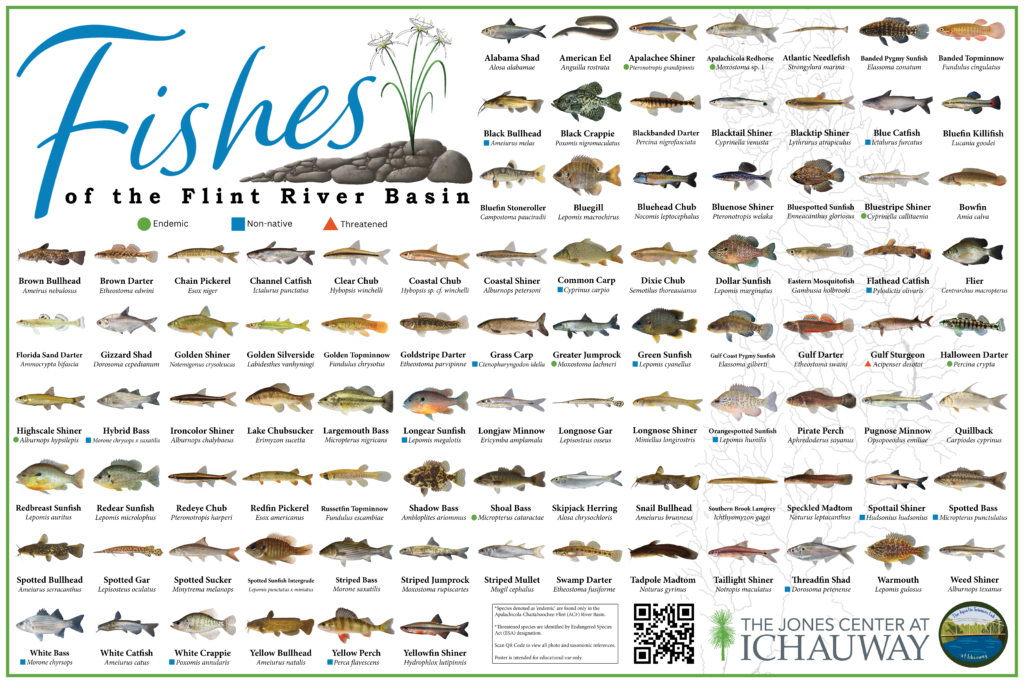
Fishes of the Flint River Basin
The Aquatic Sciences Lab at The Jones Center at Ichauway is excited to share a compilation highlighting the incredible fish diversity of the Flint River Basin. Using a wide range of sources, we identified 92 species of fish present in the Flint River Basin, including native, endemic, threatened, and non-native species. Species designations and ranges are constantly changing and we are dedicated to keeping up to date with changes in fish taxonomy, distributions, and watershed scale conservation efforts to promote fish diversity. A link to the poster can be found here: here.
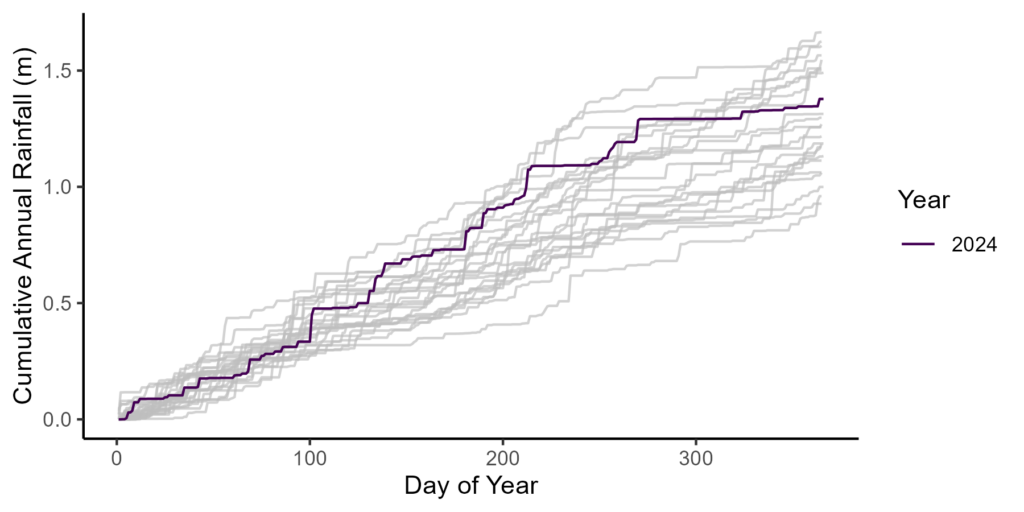
Ichauway: Rainfall Wrapped 2024
Happy New Year from the Aquatic Sciences Lab! The lab celebrates our first-year anniversary this month and we are looking both backwards at a busy 2024 and forwards to an exciting 2025. We will be making our way to you at conferences and welcoming new lab members and graduate students (more to come soon!). As we reflect on 2024, we look back on the year in rainfall. Maybe this becomes a recurring post around the beginning of the year? Maybe we evaluate a different measurement that we (or our collaborators) make continuously throughout the year? But for today… Rainfall Wrapped! The Jones Center collects rainfall in a few locations and in collaboration with various partners. Rainfall is collected by the Ecohydrology lab at climate stations and in various wetlands across the property. They use wetland rainfall collectors to precisely determine water budgets, which is a challenge for our many tiny
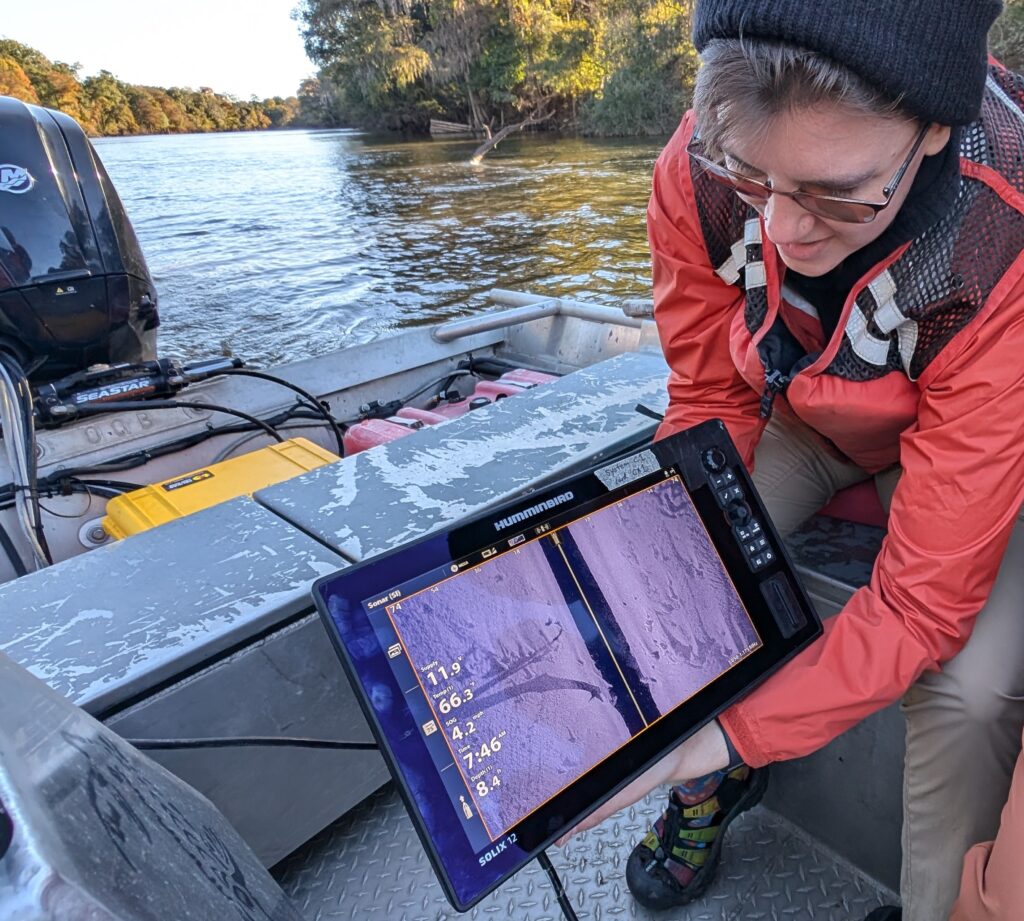
Side-Scan Sonar Training with USFWS
Last month we had the privilege of hosting Dr. Adam Kaeser and Jake Roush of the Panama City US Fish and Wildlife Conservation Office. Adam is currently the Gulf Sturgeon Recovery Lead for the Service but has roots here in the lower Flint River basin (LFRB) after starting his research career as a Fisheries Biologist with GADNR. Jake is a Biological Science Technician for the Service while also pursuing a master’s degree examining endangered and threatened freshwater mussel species using eDNA techniques. During their visit, our team got to learn new methods for studying benthic habitats in streams using side-scan sonar (SSS) techniques. Adam pioneered these methods in habitats of the LFRB in the early 2000’s and has since continued to work on how best to collect, process, and apply these data, train others in these processes, and adapt to new technological advances! We teamed up with the Mussel Conservation
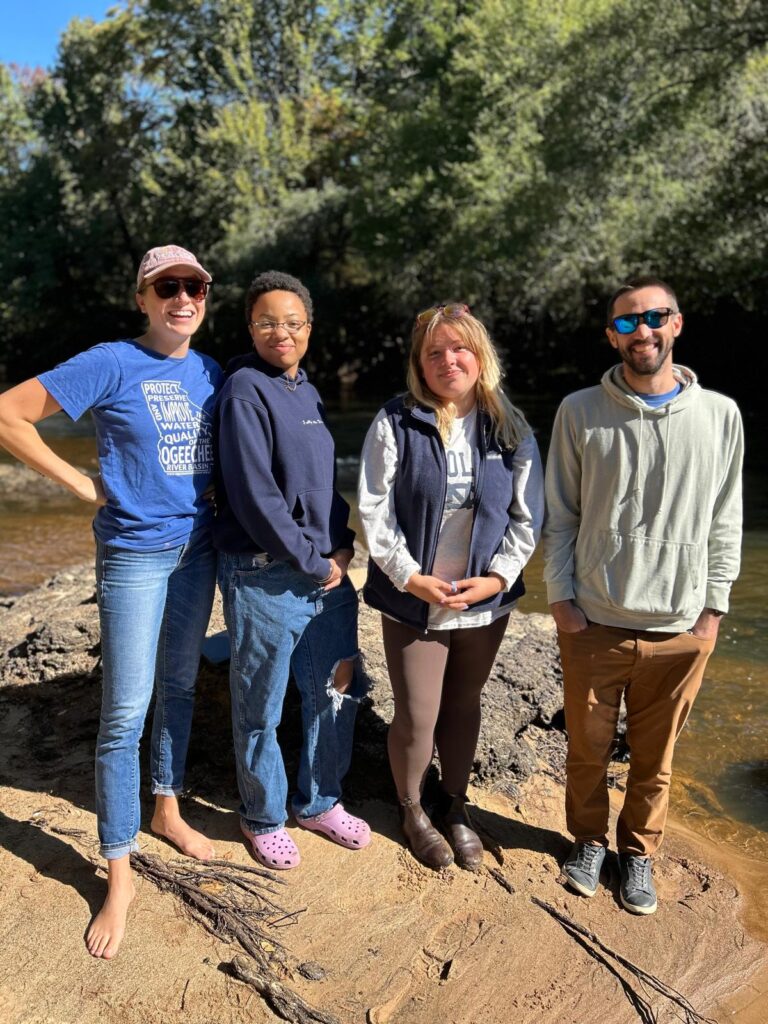
Wrapping a Busy Fall in the Aquatic Sciences Lab
The Aquatic Sciences Lab at the Jones Center is happily exhausted on this first proper cold day in SW GA! As we near the end of the lab’s first year, we have made lots of progress and collaborations to report on, many happening in the last few weeks. We have our first exchange of personnel in the lab, as the NSF Woods2Water RaMP project moves into the next phase. Our RaMP lab member, Jewell Johnson, will head to Tuscaloosa to learn with collaborators at University of Alabama and NEON, while we work with her to analyze dissolved oxygen patterns in isolated wetlands. We’ll miss having you in person, Jewell! On the flip, Dustin Benton will join the lab from Tuscaloosa for the next few months! Dustin will avoid the heat and gnats of SW GA summertime and experience the winter and spring at Ichauway. Nick also visited the College of
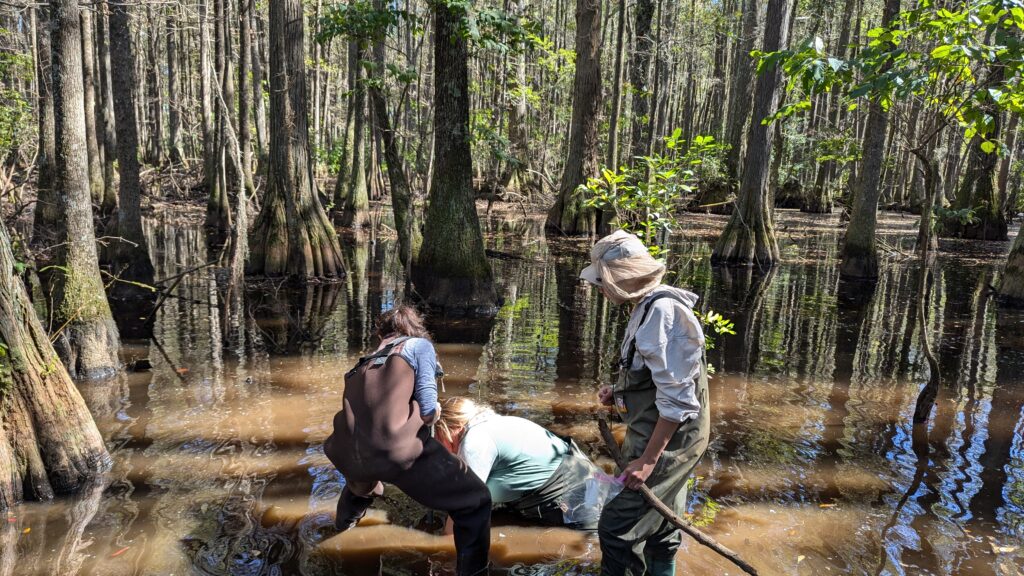
Recruiting: PhD Student, Fall 2025 @ UNC
We’re recruiting a PhD student! With Dr. Amanda DelVecchia at UNC-Chapel Hill, we are looking for a student to study methane dyanmics in the isolated wetlands at Ichauway. Projects will include (but not limited to): methanogenesis, methanotrophy, methane emissions, methane in food webs, and upscaling See more details on the Prospective Students page and Dr. DelVecchia’s site!
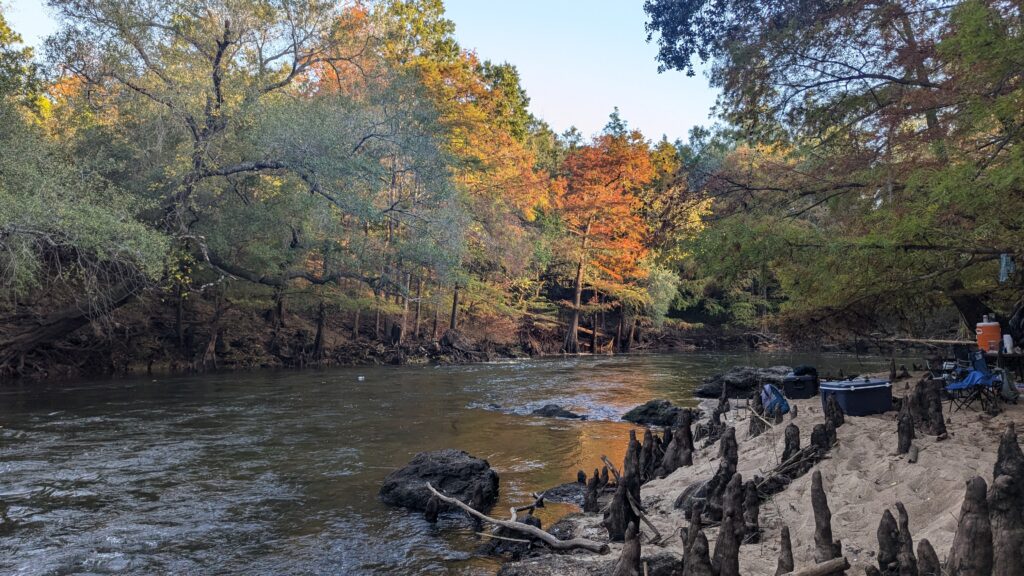
Diel Sampling for Nitrogen
Last week, we were thrilled to host Abagael Pruitt and Ryan Meyer, both PhD students in the Tank Lab at Notre Dame. Like the Jones Center, the Tank lab has research interest in streams and rivers embedded in agricultural landscapes and the interaction of land-use on water quality and biogeochemistry. In this visit, we focused on methods to measure denitrification, the microbial process that converts nitrate (NO3-) to nitrogen gas (N2), a process of tremendous value in removing nutrients from rivers. We collected water samples (every hour for 36 hours!) that Abagael and Ryan returned to Notre Dame to analyze for N2 and argon concentrations. We also collected samples for NO3 and NH4 that we will analyze at the Jones Center, dissolved organic carbon (DOC), and continuous dissolved oxygen. We will use these data to understand aerobic metabolic processes, surface water turbulence, and ultimately denitrification rate and compare our sites
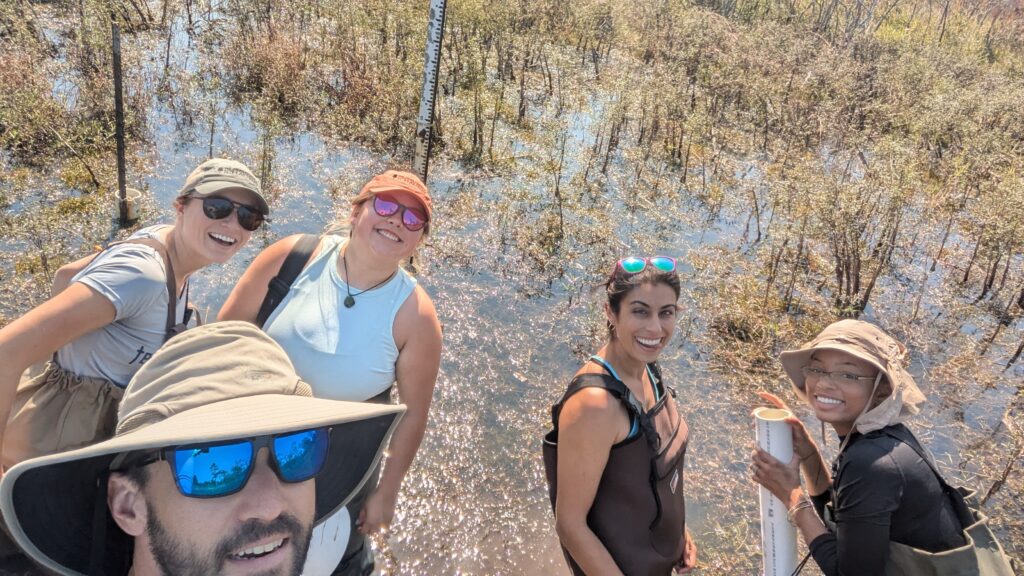
New methods in methane dynamics in isolated wetlands!
The week of October 14th, we thrilled to host Dr. Amanda DelVecchia, from the Department of Geography at UNC-Chapel Hill. In addition to delivering an excellent Lord of the Rings themed greenhouse gas dynamics seminar on Tuesday afternoon, we focused on developing new methods of measuring methane oxidation and methanogenesis from geographically isolated wetlands at Ichauway. We learned a lot and had great discussions about science, life management, and variability. Amanda picked an ideal week to visit: post-gnats, cool weather, low humidity. We look forward to her visiting in the summer! Find more about Amanda on her social media and website.
